Jokowi’s Legacy: An Inefficient Economy
Prabowo Subianto is inheriting an inefficient economy. Yet his new administration is likely to follow Jokowi’s economic model.
maaf email atau password anda salah

Prabowo Subianto is inheriting an inefficient economy. Yet his new administration is likely to follow Jokowi’s economic model.

Artha Graha Group founder Tomy Winata talks about the Rempang Eco-City, Nine Dragons, as well as various allegations against him.

Coal-fired PLTUs are the world’s biggest carbon polluters. Green taxonomy revisions open up possibilities for transition-washing.
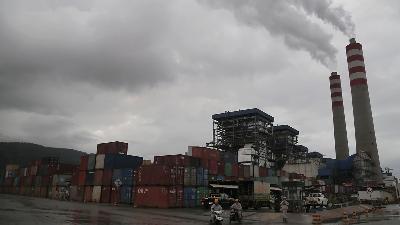
The OJK changes the Green Taxonomy criteria. Coal and palm oil are now in the green category based on aspirations from banks and industry actors.

Circular economy is believed to be one of the ways to solve plastic waste problems globally.

In Indonesia, the green economy has become nothing more than a slogan. Government policy is now heading in the opposite direction.
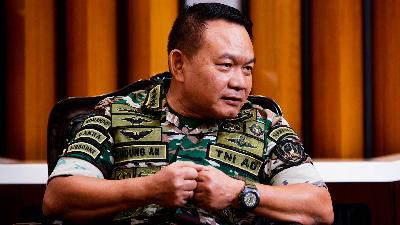
The Army Chief of Staff, Gen. Dudung Abdurachman, talks about how to deal with armed groups or the KKB in Papua.
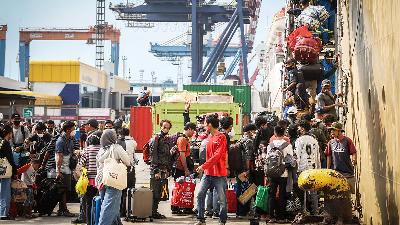
There is an upsurge in the annual return of people to their hometowns or mudik after the repeal of the Covid-related social restrictions. A turnover of trillions of rupiah stimulates the economy.
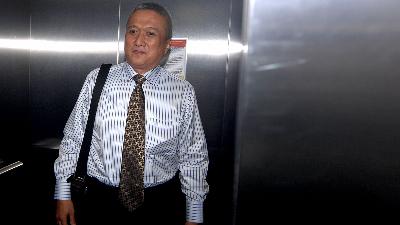
Sudrajad Dimyati once failed to make Supreme Court justice because of a bribery scandal in a restroom inside the DPR building. His wealth multiplied when he became a high court judge.
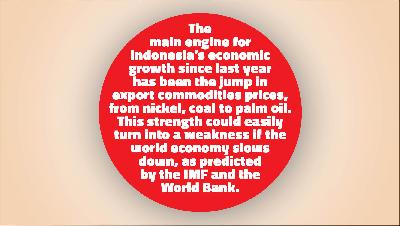
The Indonesian government did not factor in the risk of global economy slowdown in their policies.

The impact of the public activity restrictions (PPKM) slashes people’s income and economy, particularly those working during the curfew.
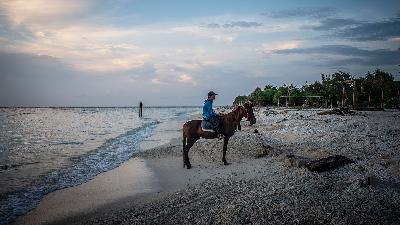
Central tourism regions are having a hard time recovering after the pandemic struck. New problems emerged in other sectors of the economy.

National economy crippled by the Covid-19 has left very little room for the government to maneuver as the country slowly sank into recession. Like in many other countries, the hegovernment will focus the next year’s development agenda on the economic recovery.

Technology accelerates the pace of change in financial services. Progressive measures are needed to ensure that Indonesia can optimize the potential of the digital economy sector.

AS it turns out, Covid-19’s toll on the Indonesian economy exceeds many analysts’ expectations.
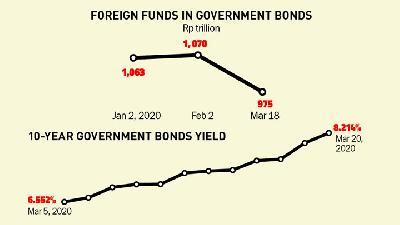
OUR economy is severely bleeding. There has been a rapid outflow of foreign exchange in the past month.
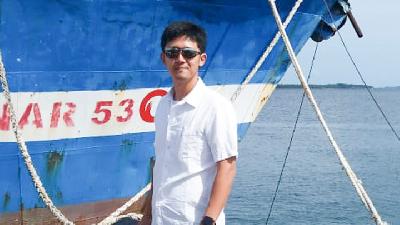
DESPITE being less popular in the Artha Graha Group business circle, Adithya Prakarsa Winata is at the center of the plan made by the corporation founded by his father, Tomy Winata, to be involved in the Masela gas project.
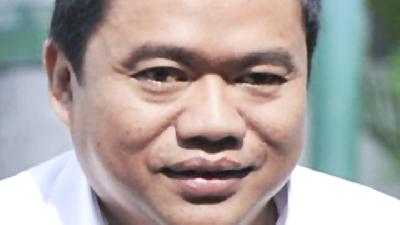
THE world economy is grinding slowly. Recession is right at our door. The World Trade Organization (WTO) estimates that international trade this year only grew by 1.2 percent, it is the lowest since 2009. World trade is a vital engine for the economy. If it slows down, business activities around the world will turn anemic.

The grim mood blanketing the world economy grows thicker. An increasingly uncertain trade war is not only hurting China. The US economy is also showing signs of weakening. If two of the world’s largest economies are feeling the pain, many other countries will certainly feel it too.

The polygamy regulation in the proposed Aceh qanun has triggered debate. This is a result of the vague regulations on special autonomy.

THE Indonesian armed forces, particularly the army, found itself caught in a crossfire between supporters of Joko Widodo and Prabowo Subianto who are bitterly polarized in the recent presidential election.

Smitten with the anatomy of plants since her college days, Ratih Damayanti invented an automatic wood identification tool. One app to identify hundreds of varieties.
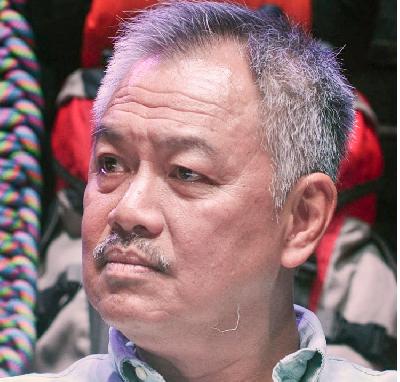
Tomy Winata, who claims to to have been assigned Geria Wijaya Prestige’s debt account by one of its creditors, reported Hartono Harjadi and his colleagues to the Bali Police in February.
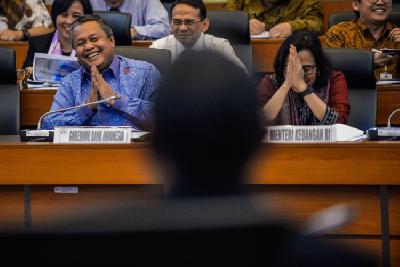
PERRY Warjiyo, 59, is like a new captain directly encountering stormy waters.

Arul Kanda Kandasamy has been preoccupied since the 1Malaysia Development Berhad (1MDB) scandal rose to the surface.

The police should be able to prove that the Muslim Cyber Army is guilty of spreading hoaxes. This would stop the threat to freedom of expression.

The potentials of Indonesia's creative economy seem better than significant.

BASUKI Tjahaja Purnama, known simply as Ahok, has gone down in history as Jakarta’s first governor to be sent to prison on the charge of blasphemy.

PRESIDENT Joko Widodo's wish to involve the Indonesian Army in fighting terrorism has sparked public debate. Some worry about the legal aspect, while others worry there may be an overlap in authority with the police.

For the first time, the Muslim Cyber Army Movement declared its hunt against people they believe have insulted ulamas or Islam through the @MuslimCyberpage Facebook account on May 21. Their invitation soon went viral. In just one week, reports of acts of persecution emerged across several regions.

Basuki Tjahaja Purnama was not proven guilty of religious blasphemy. It's high time the state abolished religious defamation clauses from the Criminal Code.

Ahok failed to win the election in one round. But he staged a comeback after the blasphemy hearings began.

The thinking of those calling for the withdrawal of savings from banks is short-sighted. They have been blinded by the increasingly heated dispute in the run up to the Jakarta gubernatorial election, which is now involving issues of race and religion, and which has spread into the banking sector. This agitation is foolish because it could trigger a financial crisis.
Finance Minister Sri Mulyani was understandably furious about the appearance of a misplaced propaganda spreading on social media. She even asked the police to arrest the troublemakers seeking to justify their political aims by any means. The problem is that the banks are the most important basis of the economic system. If the banks are destabilized, the economy will grind to a halt because the cycle of investment will be halted and the engine of growth will stall.

TOMY Winata gave several unusual messages during a fast-breaking event in early June. "I don't want to obstruct the careers of these young officers," one participant of the meeting told Tempo last week, quoting what Tomy said at the Hotel Borobudur gathering in Central Jakarta.
Tomy also spoke of narcotics eradication. "If anyone in my family uses drugs, break their leg first then report it to me," said the Artha Graha group boss. He also bragged about being acquainted with senior police officers. Three Bareskrim investigators, who were present, mostly stayed quiet during the 90-minute meeting.

SINCE September last year, the government has issued 12 economic policy packages aimed at attracting investments and accelerating growth. However, there are hurdles making the policies difficult to implement.
"It will be good if we can survive," Coordinating Minister for the Economy Darmin Nasution said in an interview at his office on June 29. To Tempo reporters Agus Supriyanto, Akbar Tri Kurniawan, Ayu Prima Sandi, Ali Nur Hidayat and Gustidha Budiartie, the former Bank Indonesia governor spoke about problems hampering the effectiveness of deregulations.

Indonesia is endowed with a rich biodiversity that offers the country huge potential to develop a tourism industry based on an environmentally responsible program. Compared to conventional tourism, ecotourism offers extra benefits. Besides generating revenue, it is an effective medium for education and environmental conservation. Take the biodiversity park in Bangka-Belitung, developed by a group of local environmentalists. They succeeded not only in revitalizing the local economy badly affected by the collapse of the tin industry, they have also proven that through ecotourism, both local residents and tourists can be taught to conserve nature.
Azwir Malaon, deputy assistant minister for tourism at the ministry for tourism development and creative economy, said that these benefits would enable them to maximize Belitung's eco-tourism potential in the next three years, among others, by improving infrastructure and involving both the public private sectors. "Efforts to conserve nature, to improve people's welfare and to boost revenues can go hand in hand," he said. Two weeks ago, Azwir sat down for an interview with Tempo in his Jakarta office. Excerpts:

AYU Ekaristi is not like most high school students. She does not spend her afternoons playing sports or enjoying other typical afterschool activities.
When the final bell rings and school lets out, she gets to work, scouring Denpasar, Bali, for potential customers for 4Dem S.C., the company she runs with her Vocational High School No. 4 (SMK 4) classmates. "My tasks include public outreach to promote our products," the 17-year-old said.

Central banks are impotent and out of ammunition. There is much talk about this ridicule among economists, seeing central bankers' futile efforts to recover optimism and economic growth. No less than Mervyn King, former Bank of England governor, had to admit that sense of powerlessness in his new book The End of Alchemy.
King's confession carries some truth. Various central banks, like those in Europe and Japan, have deployed a myriad of policies-from quantitative easing, which is basically printing money to buy government bonds, to squeezing the interest rates to a negative level. And still, the economy refuses to rise from its stupor.

Happy 2016. We all need a moment of prayer when facing tough challenges. Indonesia, especially, a country whose economic health depends very much on commodity prices, continues to remain soft.
One key factor determining our economy's 2016 destiny is China. When its economy grows, there is hope that commodity prices will move in sync. In turn, the trickle effects from rising commodity exports should help lift Indonesia up.

After five years of steadily deteriorating economic performance, the Indonesian economy may be in the process of turning around. After reaching a 21st-century high of 6.4 percent in 2010, the country's GDP growth rate has been lower every year since. It is unlikely to be higher than 4.7 percent this year, the lowest level since the 2009 global crisis. There are now some signs that the slump may be ending, however, and 2016 growth may exceed five percent. What caused the last five years of decline? What is causing the fledgling recovery and what are its prospects for success?
Changing Directions

Our economy has gone through a rough patch last year and, unfortunately, the prognosis for this year remains cloudy. Depending on one's view of the market's potential reaction to a much-awaited US interest rate hike, there are two opposing views emerging. At the optimistic end are those who expect a slight bump, noting that asset prices have already factored in the upcoming rate hike. But, at the other end are those expecting a bigger jolt. People in this camp are worried about a toxic mix of a significant weakening of emerging-market currencies and a large US dollar public and private debt burden, all of which could translate into a major crisis. With the continuing global economic malaise, even the US economy might not be immune to this potential crisis, the pessimists further argue. For Indonesia, this camp points to a weaker 2016 growth of 4.5 percent, at best.
However, even the optimists are cautious, with their subdued 5.0-5.3 percent forecast. The positive scenario starts with a weak first half of 2016, a carryover from this year. The difference, however, is that with inflation brought down to Bank Indonesia's comfort range of 4-5 percent and a benign market reaction to a rise in US interest rates, a much sought-after cut in Bank Indonesia's interest benchmark rate could happen as early as the second quarter of 2016. This, the optimists argue, should breathe some life into the lackluster economy in the second half of 2016 and point to a stronger 2017 outlook.

Although growth is still predicted at around 4.8 percent, the plunging value of the rupiah has battered Indonesia's economy in 2015. Hence the spotlight on Bank Indonesia, the central bank, and its efforts to safeguard monetary policy. The problem is that the Federal Reserve's decision to postpone deciding on the interest rates to next year is simply feeding more speculation. With the Chinese economy continuing to slow down, the situation is still far from comfortable for the Indonesian economy. "External conditions will still contribute to the stability of the financial markets and the stability of the financial system," Bank Indonesia Governor Agus Martowardojo told Tempo reporters Tomi Aryanto, Yandhrie Arvian, Ayu Prima Sandi and Andi Ibnu in an interview at the end of October.

Crowdfundingfinancing a project or a business by raising money from the publicis a relatively new trend in Indonesia. According to Fajar Hutomo, Deputy Director of Access to Finance at the Creative Economy Agency, it has only become popular five years ago. But actually, Indonesia is familiar to koperasi (cooperatives), a collective system of funding. "That's the original Indonesian crowdfunding," said Fajar.
Crowdfunding is a project-based systemnot a long term financing institution. Nevertheless, its effectiveness has been proven through the use of local websites such as kitabisa.com or wujudkan.com, that have successfully financed various charities, startup businesses, as well as social entrepreneurship.

The last time former Bank Indonesia governor Darmin Nasution involved himself with the government was in 2013. Yet when he did rejoin, it was straight towards an economic morass. This time around, he was made coordinating minister for the economy, replacing Sofyan Djalil. Darmin is new in the cabinet, yet he faces a daunting task: to ensure that Indonesia gets away from the global economic storm.

THERE is no question that Triawan Munaf's background qualifies him to be chairman of the Creative Economy Board (Bekraf). He certainly is no stranger to the world of creative industry. During the 1970s he was a vocalist with the Bandung-based rock band Giant Step and a decade later, set up the Euro RSCG Adwork company. The company was the agency that came up with the logo of a red bull, which is now the icon of the Indonesian Democratic Party of Struggle (PDI-P). "I have worked with creative people for decades," said Triawan.
He is convinced that this sector has huge potential. In his books, the potential can earn Rp500 trillion, or seven percent of Indonesia's gross domestic product (GDP). He predicts that five years from now, this figure can double to 14 percent of GDP. He cites as example, the popular computer game 'Slide The Block', which was created by Alegrium, a local company. "This game is now rated in the top four by the App Store. Amazing, right?" said Triawan.

It has been 30 years since Sudradjat 'fell in love' with coconuts. The thesis and dissertation of this lecturer of Agronomy and Horiculture at the Bogor Institute of Agriculture (IPB) were all about coconuts. He claimed to have been attracted to the philosophy of the cocounut tree-also known as 'the tree of life'. The coconut can grow anywhere and it has become, "the symbol of beauty in the tropics," said Sudradjat.

The YEAR 2015 is still being shadowed by global inertia, which unquestionably is having an impact on the domestic economy. This is why the government is pushing investment as the main engine of economic growth, which is expected to reach seven percent in five years time.

I Wayan Hery Christian rushed out of his prison cell at the Maesa Detention Center in Palu, capital of Central Sulawesi. He wore a white T-shirt and black jeans and beamed when he saw his attorney, Nurhana, who visited him around noon on Wednesday last week. "When will the execution letter be issued, Bu?" he asked. "Just wait," the lawyer said.
Christian is in prison for the crime of blasphemy. The Palu District Court sentenced the Palu College of Pharmacy student to seven months behind bars for spreading hatred of an ethnic, religious, racial or intergroup nature on the social network, Path. "The defendant is found guilty of blasphemy by means of information technology pursuant to Article 28 paragraph 2 in conjunction with Article 45 paragraph 2 of the Electronic and Transaction Information Law," presiding judge Abdul Halim Amran said as he read out the verdict three weeks ago.

In a plenary meeting at the House of Representatives (DPR) on Tuesday last week, a wave of legislators interrupted the proceedings to question a number of changes the new president has announced for his cabinet. Among other things, they questioned Persident Joko Widodo's break-up of the Tourism and Creative Economy Ministry, which no longer included the creative economy aspect.
Legislators from the Golkar Party and the National Mandate Party (PAN), which supported failed presidential candidate Prabowo Subianto in the July election, said they would write President Jokowi about the matter. "The Creative Economy Ministry was promised in the campaign but now it has been eliminated," said Tjatur Sapto Edy, chief of the PAN's faction in the House.

During the corner-stone laying ceremony of the Bogor Institute of Agriculture (IPB) back in 1961, former President Sukarno requested that IPB produce as many agronomists and horticulturists as possible. "He knew the diversity of Indonesia's environment, and agronomists and plant breeders were needed everywhere in the country," said Muhamad Syukur, Professor of Agronomy and Horticulture at IPB.
According to Syukur, commodity plants would grow better if they were studied and treated so their genes could be improved to become better varieties. Tempo English reporter Syari Fani interviewed him two weeks ago on the problems faced when cultivating plants.

WEDNESDAY last week was a happy day for Indonesia's Armed Forces (TNI) chief commander, Moeldoko, who celebrated 29 years of his marriage to Koesni Harningsih. The front porch of his home in Central Jakarta was full of congratulatory floral wreaths and bouquets.
Inside, the happy couple sat across a table on which the ceremonial, conical rice dish was placed. Moeldoko, clad in his four-star army uniform, sitting next to his wife Koesni, recalled how they first met. "There wasn't much of a courtship. We met, I proposed and she said yes," joked Moeldoko.

AINUN Najib's eyes were glued to the iPhone he held, occasionally moving his thumb on the screen, when Tempo met him at the lobby of a well-known hospital in Singapore, on Saturday last week. Ainun had been reluctant to give an interview, given the notoriety kawalpemilu.org, the site he created, had gotten in his home country, these past few weeks.
He had lain low the past two days, on information that a certain person claiming to work for the campaign of one of the presidential candidates was hunting for him. "I must lie low before July 22," Ainun told Tempo. That was the date the General Elections Commission (KPU) was scheduled to announce the official final tally of the presidential election. He was willing to be interviewed after he checked out the background of the Tempo reporter Mahardika Satria Hadi, whom he met in Singapore. "My apologies for having to cross-check you first," said Ainun. But when he did agree to speak about it, he spoke intensely and passionately about the election vote-count website he created overseas, together with two of his colleagues.

On March 29, 1966, I was teaching at the Ledemanu primary school in the regency of Sabu Raijua, East Nusa Tenggara (NTT), when a military man from Kupang summoned me to carry out a state duty on the Island of Sabu. I was forced to do so, I did not go voluntarily.
There were 61 others in the extermination team. The calculation was that one Indonesian Communist Party (PKI) prisoner had to be guarded by two persons. Thirty-one prisoners would be executed that night. So, there were 62 guards, including myself.

Next year's political hoopla need not be a serious distraction. The Indonesian economy is predicted to continue growing, albeit with certain reservations.

In the effort to seek sustainability, we look at alternatives and options, so the goal of equitable growth is achieved. Few people are aware of one option called the Blue Economy. The following is a very possible alternative in the economic supply chain which should seriously be considered.

Eleven members of the Special Forces Command (Kopassus) have been indicted in the attack on Cebongan Penitentiary in Sleman. The Armys investigation team tried to conceal some facts.

Many of the rebels fighting government troops are defecting members of the Syrian army.

There are concerns that Government Regulation No. 66/2010 may threaten campus autonomy. The University of Indonesia acted swiftly and raised objections.

The Attorney General’s Office appears to have given up trying to get its hands on Tommy Suharto’s money in Bank Paribas in the UK. The corruption allegations relied on were weak and easily fended off by Tommy’s lawyer. The government will now focus on Tommy’s money in PT Timor Putra Nasional.

Indonesia's economy fell just short of the estimated growth rate. Predicted to reach over 6 percent, the economy fared unsteadily at the end of the quarter and only grew by 5.8 percent, caused by a drop in agricultural performance following harvest failures and extreme weather. Food prices soared. Inflation ran high. The situation was worsened by limited electricity resulting from minimum new infrastructure. Government expenditure, normally involving large amounts, was less intense. The weak budget absorption led to less optimal development and contributed to the lack of liquidity on the financial market. Consequently, the initial economic revival was restrained. The momentum for greater strides was unnecessarily wasted.

Eleven years after regional autonomy was launched in Indonesia, centralized power was redistributed around many parts of Indonesia. But the intended result of equitability remains out of reach. A number of the new provinces have made good of their autonomy, yet others remain poor if not worse off. Weak rural economies have not been helped by the worsening infrastructure. In retrospect, was regional autonomy a mistake? A special report by a joint production of Koran Tempo and Tempo English Edition on how autonomy has affected Kalimantan, Flores and Papua.

The Supreme Court grants the government’s request for a judicial review in the case of PT Timor Putra Nasional’s Rp1.3 trillion in Bank Mandiri. Tommy continues to put up a fight.

The Constitutional Court rejected the appeal to revoke the Blasphemy Law. The House of Representatives was asked to revise the contentious legislation.

Tommy Suharto is running for General Chairman of the Golkar Party. Money may not be a problem, but there are obstacles.

Tommy Suharto is vying for the Golkar Party chair. Aside from his extensive funds, what asset does he have?

Despite protests over special autonomy, the Papuan government is determined to see it through for the benefit of the people.

Indonesian Economy 3rd Quarter 2008
Still High, Positive Signals
The national economy is not as lethargic as many people think. Although lower than the second quarter, Indonesia's economic growth in the third quarter is relatively high at 6.1 percent. In the next few months there will be positive signals. Declining commodity prices are relaxing pressures on inflation. Bank Indonesia may lower interest rates starting the beginning of the next year. The business world and consumption sector may still grow. As such, economic growth is estimated to remain high. But the government must be prudent. Non-performing loans in the plantation sector have the potential to increase.

Anwar Ibrahim has again been accused of sodomy, with 23-year-old Saiful Bukhari lodging a complaint with police. But is it true that Saiful has close links to Malaysia’s Deputy Prime Minister Najib Razak?

Rising inflation is putting heavy pressure on the Vietnamese economy.

Questions still remain regarding the release of funds belonging to Motorbike Corporation, a Bahamas-based company owned by the convicted Hutomo Mandala Putra alias Tommy Suharto. The law firm owned by Minister Yusril Ihza Mahendra helped him to get this money, which was released from Bank Paribas London in February 2005.
Supporting documents from a number of government offices and state institutions were obtained, thanks to the assistance of one of the subordinate officials working under Yusril, who at that time was the Justice & Legal Affairs Minister. This official even used a departmental bank account—as authorized by Minister Hamid Awaludin, Yusril’s successor. What was the motive for Yusril and Hamid to assist in the release of that Rp90 billion?

Where did the Rp425 billion belonging to Tommy Suharto in the Paribas account come from?

The disputed case of the Rp425 billion owned by Tommy Suharto will be heard in the Guernsey District Court, Great Britain. The Indonesian government has prepared a stack of documents in order to prove that these funds were illegally obtained by means of corruption, collusion and nepotism, carried out by the youngest son of former President Suharto.
Tommy insists the money is his.
However, one point has escaped the publics notice: in 2004 Tommy withdrew Rp90 billion of his money from the London branch of Bank Paribas. The bank was willing to release the money because the Indonesian government had guaranteed that the money was not in dispute. Tommy had hired the Law Offices of Ihza & Ihzafounded by former Minister of Justice & Legal Affairs, Yusril Ihza Mahenderato handle the disbursement of the money. Was Yusril involved? And how far did Justice & Human Rights Minister Hamid Awaludin intervene in the case?

The AGO has reopened investigations into the Tommy Suharto national automobile scandal, questioning over 10 witnesses.

The Papuan Tribal Council has decided to return the special autonomy status to the central government.

Pygmy elephants in the Kalimantan forests are different from elephants in Sumatra and other Asian countries. Malaysia is using mini-transmitters to carry out research.

Tommy Suharto confirms his interest in the Tanah Abang renovation project. Meanwhile Traders await the cheapest price.

The 2004 elections will determine the process of Indonesias economic recovery. If successful, recovery will accelerate. If not, the economy will worsen internally.

After a long preparation, Tommy Suharto is appealing for a judicial review of his case. Is the new evidence strong enough?

Israel's economy continues to deteriorate. The kibbutzim need to do some business acrobatics.

Two Indian businessmen were put behind bars by the police following a commercial dispute with Bank Artha Graha. This may well be more proof of Tommy Winata's might.

The government has granted Tommy Suharto another month off his prison sentence. Is this decision based on Tommy's good behavior, or lobbying from the Cendana family?

Complaining they have not received an appropriate cut, Cendana enforcers are suing Tommy Suharto for Rp108 billion.

The majority of respondents consider Tommy Suharto should have at least got a similar sentence to those convicted of the murder of Justice Syafiuddin Kartasasmita.

Tommy Suharto has refused to appeal. Just exactly what moves is he really plotting?

Tommy Suharto complained about the sentence, but decided not to appeal. What are Tommy and the Cendana family up to?

For protesting against the special treatment of Tommy Suharto, 40 Cipinang inmates were relocated.

Tommy Suharto refutes the testimony of all witnesses during his trial. Who will benefit from the appended judicial panel?

Like Bob Hasan, Tommy has built a palace at Cipinang jail. But many prisoners are unhappy about it.

Tommy denies any involvement in the killing of Justice Syafiuddin. Can the courts penetrate Tommy's defences?

World leaders attending the World Economic Forum are convinced that the economy will recover and that the United States will be the motor. But there are also those who feel there could be a second economic recession.

Two defendants on trial over the killing of Supreme Court judge Syafiuddin Kartasasmita say their paymaster was someone called Frans, not Tommy Suharto. But two other defendants have treated the tale with scorn.

The men accused of carrying out the killing of Supreme Court judge Syafiuddin Kartasasmita may be lucky indeed if they are acquitted. But the claim that Tommy Suharto was the mastermind behind the murder is slowly being undermined.

For the Suharto clan, Tommy's capture is just the start of a new episode in their lives.

The result of our weekly poll blames shortcomings in the concept of regional autonomy for the Semen Padang takeover row.

A new book discusses the American economy of the past few years. It's a publication heavily biased toward the Republican worldview.

The Chief of the Supreme Court plans to set up a special team to clarify the judicial review of Tommy's case. But will this serve any purpose?

The economy is expected to slide further downhill: businesses will slump and unemployment will rise. But don't be too quick to blame it on Osama or the United States.

Tommy Suharto, hunted by the police, is now exonerated. But it's still a long story. Be patient or be nauseous.

Although they've exhausted themselves, the police have only managed to confiscate fugitive Tommy Suharto's cars. When will the time come for the owner to be arrested?

It is not easy to catch Tommy Suharto, the fugitive connected with PT Goro Batara Sakti's property-swap scam who has disappeared for nine months. Greater Jakarta Police's Special Detective Team have ransacked a number of places and tailed many people, but Tommy has proved slippery. The son of Suharto even stopped by his sister's house on July 15 for her birthday party, despite the Cendana area being the police's top priority target area. Just where have the police found Tommy's trail?

KAREN Agustiawan's meeting with the head of the United Federation of Pertamina Labor Unions (FSPPB), Ugan Gandar, was supposed to deal with a cooperation agreement. Then the subject shifted to a hotter topic. "Is it true you're going to resign?" Ugan asked Karen, CEO of Pertamina, the state oil and gas company.
Karen did not deny it. The 56-year-old woman confirmed her plan to step down. At first, she said she wanted to focus on her family and give lectures at Harvard University in the United States. Unsatisfied with that answer, Ugan pressed further. "Finally she admitted she was resigning because she refused to be victimized," Ugan told Tempo.
Independent journalism needs public support. By subscribing to Tempo, you will contribute to our ongoing efforts to produce accurate, in-depth and reliable information. We believe that you and everyone else can make all the right decisions if you receive correct and complete information. For this reason, since its establishment on March 6, 1971, Tempo has been and will always be committed to hard-hitting investigative journalism. For the public and the Republic.